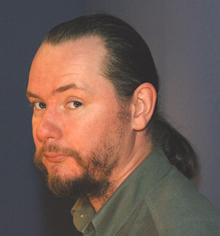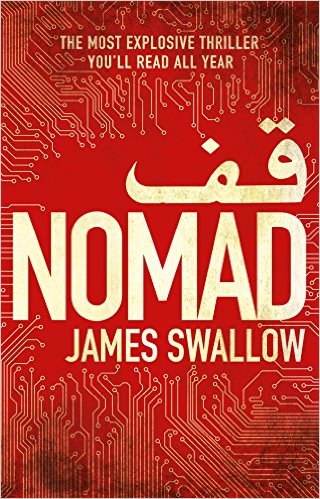Nomad by James Swallow
When I read James Swallows’s bio I had a distinct I-am-not-worthy moment. He’s a bestseller, a BAFTA nominee—but thank goodness he’s also a really nice guy, who answered my questions with both wit and wisdom. Writes a nifty book, too.
How do you compare scriptwriting and novel writing?
At the end of the day, it’s all just storytelling. Plot is plot, characters are characters and it doesn’t matter if you’re writing prose fiction or an opera. But I think the real, qualitative difference is in the toolkit a writer has to tell that story. A story presented in a script offers opportunities to explore narrative in ways that a novel can’t, and vice-versa. That’s why I love being able to do both–it’s like exercising different muscle groups.
Have you ever been writing and discovered something totally unexpected about one of your characters?
I tend to plot pretty deeply so reveals that emerge unexpectedly as I write don’t happen often–but yeah, there are times when a character’s voice will assert itself and you’ll realize that their reaction to a given situation isn’t what you first expected it to be. To me, that’s a sign you’ve given them a degree of life beyond the page.
NOMAD appears to be a departure from your usual genres. Why the change? What were the challenges in stepping into pastures new?
I’ve certainly written a fair bit of genre fiction in futuristic worlds and alternate realities, but NOMAD isn’t the first contemporary thriller; back in 2014 I wrote Deadline, an original novel based the TV show 24. There were a lot of things that drove me toward the idea of writing NOMAD; at the heart of it was the fact that I love these kind of books! But I think I was also looking for a challenge, for the opportunity to test myself as a writer and do something a little outside my comfort zone.
Research is always an important part of writing, whatever the genre. What were your best resources/sites for NOMAD?
I regularly scour tech blogs and military-industrial sites like Wired, Gizmodo, War is Boring, Danger Room, Havocscope and others for interesting stories and story seeds.
I’m a great believer in an arresting first line—did you have your first line for NOMAD right from the start? How do you ensure you have a beginning that will draw the reader in?
Actually, getting the opening right for NOMAD was something that I went around and around on—and for me, that curtain-raiser in the first chapter, first paragraph, first line is the thing that sets the tone for the rest of the novel. I think that stories that start off with an arresting image or a strong sensory element are the ones that hook me from the get-go.
As a Londoner, I too often find that novels set in the city are cliché ridden. How did you avoid making the London scenes stereotypical?
I know what you mean! As a London lad, born and bred, it particularly ticks me off when someone depicts my hometown wrongly, or in a clichéd manner. When I was writing the London scenes in NOMAD, I just tried to keep them as true to the city I know as I possibly could. In fact, that’s something I try to do with every location in the novel—most of the places the story goes to are places I’ve visited, and I hope that translates into a sense of authenticity for the reader.
One thread that struck me in NOMAD was the element of what makes a boy into a man. I’m interested in your thoughts on this. Is a man made by his deeds or his attitudes?
On one level, NOMAD certainly is a story about a character undergoing a state change from someone out of the firing line to someone who willingly places himself in danger. I like to think that in life, we are what we do, that it is deeds and not words that we’re ultimately remembered for.
What would be the best two bits of advice you’d give to an aspiring author?
The first piece of advice would be just two words: finish It. I often talk to writers who are still learning the craft and they talk of how they abandon a story half-finished because it isn’t working for them—but the act of powering through that barrier and landing a finished work is one of the most useful exercises you can do as a writer. Even if what you have at the end isn’t what you wanted, you’ll learn and grow from the process.
And the second would be: don’t be precious with your ideas. Remember that ideas are the currency of writing, which means you have to be willing to spend them—and if you can’t come up with more ideas to replace them, you’ll have a hard time being a writer of fiction.
Which book (by another author) do you wish you’d written and why?
I’d say none! Because while there are some amazing books out there that I would love to have my name on, the truth is that they would be entirely different works if I had been writing them.
Which book do you wish somebody else would write?
I guess to answer that, I’d think of all the great writers who are no longer with us and wish we could have more of their work.
*****
 James Swallow is a veteran author and scriptwriter with over 15 years of experience in fiction, television, radio, journalism, new media and videogames. The author of 40 books in nine different worldwide territories, he is a three-time New York Times bestseller and a 2009 Scribe Award winner. Nominated by the British Academy of Film and Television Arts (BAFTA) for his writing on the critically acclaimed DEUS EX: HUMAN REVOLUTION, 2013’s blockbuster videogame with over 2.18 million copies sold, in 2014, he wrote the thriller DEADLINE, a debut tie-in from Tor/Forge based on the Emmy Award-winning television series 24; Swallow’s experience with other intellectual properties includes James Bond, Star Trek, Doctor Who, Star Wars, Warhammer 40000, the Royal Air Force and more.
James Swallow is a veteran author and scriptwriter with over 15 years of experience in fiction, television, radio, journalism, new media and videogames. The author of 40 books in nine different worldwide territories, he is a three-time New York Times bestseller and a 2009 Scribe Award winner. Nominated by the British Academy of Film and Television Arts (BAFTA) for his writing on the critically acclaimed DEUS EX: HUMAN REVOLUTION, 2013’s blockbuster videogame with over 2.18 million copies sold, in 2014, he wrote the thriller DEADLINE, a debut tie-in from Tor/Forge based on the Emmy Award-winning television series 24; Swallow’s experience with other intellectual properties includes James Bond, Star Trek, Doctor Who, Star Wars, Warhammer 40000, the Royal Air Force and more.
To learn more about James, please visit his website.
- The Deception by Kim Taylor Blakemore - September 30, 2022
- Death In The Aegean by M.A. Monnin - May 31, 2022
- Bad Blood Sisters by Saralyn Richard - February 28, 2022

